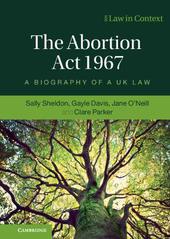
|
The Abortion Act 1967: A Biography of a UK Law
Hardback
Main Details
| Title |
The Abortion Act 1967: A Biography of a UK Law
|
| Authors and Contributors |
By (author) Sally Sheldon
|
|
By (author) Gayle Davis
|
|
By (author) Jane O'Neill
|
|
By (author) Clare Parker
|
| Series | Law in Context |
|---|
| Physical Properties |
| Format:Hardback | | Pages:358 | | Dimensions(mm): Height 244,Width 170 |
|
| ISBN/Barcode |
9781108496384
|
| Classifications | Dewey:342.41084 |
|---|
| Audience | | Professional & Vocational | |
|---|
| Illustrations |
Worked examples or Exercises
|
|
Publishing Details |
| Publisher |
Cambridge University Press
|
| Imprint |
Cambridge University Press
|
| Publication Date |
17 November 2022 |
| Publication Country |
United Kingdom
|
Description
The Abortion Act 1967 may be the most contested law in UK history, sitting on a fault line between the shifting tectonic plates of a rapidly transforming society. While it has survived repeated calls for its reform, with its text barely altered for over five decades, women's experiences of accessing abortion services under it have evolved considerably. Drawing on extensive archival research and interviews, this book explores how the Abortion Act was given meaning by a diverse cast of actors including women seeking access to services, doctors and service providers, campaigners, judges, lawyers, and policy makers. By adopting an innovative biographical approach to the law, the book shows that the Abortion Act is a 'living law'. Using this historically grounded socio-legal approach, this enlightening book demonstrates how the Abortion Act both shaped and was shaped by a constantly changing society.
Author Biography
Sally Sheldon is a professor of law at the University of Bristol and University of Technology Sydney, a fellow of the Academy of Social Sciences, an editor of the journal Social & Legal Studies and Cambridge University Press's Law in Context series and a former trustee of the Abortion Support Network and the British Pregnancy Advisory Service. She has published extensively in healthcare law and ethics. She was formerly a professor in Kent Law School, where she worked on the research for this book. Gayle Davis is Senior Lecturer in the History of Medicine. She has published widely in the history of medicine and reproductive health, including the recent co-edited volumes, Abortion Across Borders: Transnational Travel and Access to Abortion Services (2019) and The Palgrave Handbook of Infertility in History (2017). Jane O'Neill is a social historian whose research interests include twentieth-century youth, gender, and sexual behaviour. She has published on the history of courtship, contraception and abortion in journals such as History and edited volumes including Students in Twentieth-Century Britain and Ireland. Clare Parker is an historian who has worked at universities in the UK and Australia. She has published on the history of medicine and the politics of abortion and sexuality. She is also a consultant archivist currently working with the State Library of South Australia.
Reviews'This ever so readable book brings conceptual clarity and fascinating historical detail to understanding the dynamic nature of an abortion law. The book will be an invaluable guide in post-decriminalisation jurisdictions, like Australia, as health laws replace criminal laws on abortion, also becoming living texts open to contest and interpretation.' Barbara Baird, Associate Professor in Women's and Gender Studies, Flinders University and Co-Convenor South Australian Abortion Action Coalition 'Built on impressive historiographical and socio-legal foundations, The Abortion Act brings together an astounding range of materials to document and explains the resilience, evolution, and contestation of this one, decades-old statute. Written with sensitivity, rigour, and elegance, it is essential reading on abortion regulation, legal and political innovation, and the everyday politics of reproductive rights in the UK.' Fiona de Londras, Chair of Global Legal Studies, University of Birmingham 'This is an exemplary account of struggles to fix the meaning of Britain's most controversial law. It is eye-opening to see how, over a half-century, pitched battles and quiet reforms revolutionized the practice of abortion in ways no one foresaw in 1967- while hardly altering the statute itself.' Nick Hopwood, Professor of History of Science and Medicine, University of Cambridge 'This fascinating book is essential reading for anyone who seeks to understand UK abortion law, but it is of much wider significance. It shows how legal meanings are created through the complex interplay of theory and practice. Everyone who cares about the processes of law reform should study it closely.' Sir Jonathan Montgomery, FMedSci, LLM, Hon FRPCH, Faculty of Laws, University College London 'This important and impressive book chronicles the coming into force of what can be labelled the most contested Act of Parliament in English legal history. It dives deep into an impressive range of archives and is bolstered by an informative set of oral history interviews. This is a must read for theorists of social movements, feminists, socio-legal and critical legal scholars, as well as historians of the twenty-first century.' Linda Mulcahy, FAcSS, Chair of Socio-Legal Studies and Director of the Centre for Socio-Legal Studies, University of Oxford 'Qualifying in medicine in 1969 in Aberdeen, and inspired by Dugald Baird's Fifth Freedom, I grew up with the implications of the 1967 Abortion Act. And so, it was fascinating to read and understand the legal and social history, the twists and turns, of where we are now. Thoroughly researched and well presented, this book is a must for all who care about Women's Health.' Allan Templeton, CBE FMedSci, Former President of the RCOG, and Emeritus Professor of Obstetrics and Gynaecology, University of Aberdeen
|